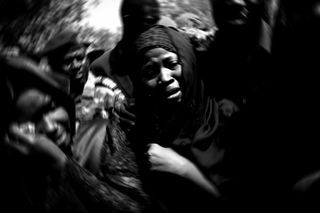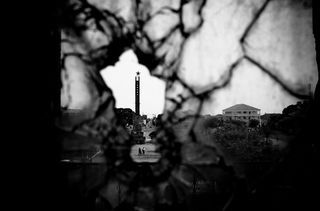Marco Vernaschi, for the Pulitzer Center
(Editor's note: This is the third of eight dispatches, recounting events surrounding the double assassinations of Guinea Bissau's president and army chief of staff last March and the country's emergence as a 'narco state.')
The nightlife in Bissau is usually so boring that sleeping is probably more exciting. After spending too many nights in my room I headed out one evening to the Palace Hotel -- a huge, Chinese-quality building on the way to the airport surrounded by a series of luxury bungalows that are always closed and empty.
A place like this, in a city like Bissau, makes no sense. On the hotel's website there's a quote from its owner, Algerian entrepreneur Tarek Arezki, declaring that he "wanted to achieve one of his dreams: to build a hotel." But why Bissau, the city that always sleeps, where in two months I didn't see a single tourist and where business is so depressed that TAP, the only airline that flies to the country, operates just one flight a week?
The answer is evident in the hotel's European-style disco-bar. This is the place in Bissau where drug traffickers and friends hang out at night, drinking bottles of whiskey that cost $100 and smoking puros imported from Cuba.
I decide to jump into the beating heart of Bissau's nightlife, when a drunken guy who speaks French drags me out of the bar. I realize the situation is tense when five other guys materialize out of the blue: they are all Lebanese, with few good intentions. They ask me what I was doing at the bar and what was the purpose of my visit to the country. They tell me they know I'm a journalist.
"We all know what the foreign journalists look for in this country and I know your name, Marco, so if I see anything published from you that mentions drug trafficking I will find you, wherever you are."
When I tell him he can't threaten me, he smiles and replies that this wasn't a threat. It was simple advice. After that, he calls his friends to take a group-picture, all together, so he'd have a souvenir of the night. Of course I can't refuse. When he holds me for the picture I feel his gun against my body.
The Palace Hotel became famous on Friday, January 11th 2008, when the French intelligence and the Judiciary Police arrested Ould Sinda and Ould Sidi Chabarnou, two al Qaida terrorists from the Maghreb wing of the organization, the Baqmi. They had killed a family of four French tourists in Mauritania and then fled to Bissau, with the aim of reaching Conakry. They spent some days at the Palace pretending to be businessmen and never left the hotel, probably waiting for a contact or for instructions.
The presence of the Lebanese community and the arrest of the two terrorists in Bissau are an alarming sign. Since the 9/11 attacks West Africa has been directly connected to the global anti-western jihadist ambitions of Osama Bin Laden. Al Qaida made logistical inroads into West Africa, seeking to radicalize regional Islamist sentiment and to benefit from the pervasive influence of organized crime.
Reports by Interpol and United Nations agencies detail evidence that cocaine traded through West Africa accounts for a considerable portion of the income of Hezbollah and Hamas, the Islamist movements based respectively in Lebanon and the Gaza Strip. These reports say Hezbollah uses the Lebanese Shi'a expatriate population in South America and West Africa to guarantee an efficient connection between the two continents.
In Latin America, both Hezbollah and Hamas are particularly active in Ciudad del Este, on the "tri-border area" where Argentina, Brazil and Paraguay converge. This freewheeling border town is famous for cocaine trafficking, piracy and contraband goods, which are often smuggled across the Parana River into Brazil. Guinea Bissau is a strategically unique trait d'union between Latin America and Europe.
To maintain and expand its political-social activities in the Shiite community in Lebanon and elsewhere, Hezbollah needs money. The estimated $120 million given annually by Iran is just a little slice of the cake. The United Nations estimates that international drug trade generates $322 billion annual revenue, making drugs by far the most lucrative illicit activity.
Most of Hezbollah's support comes from drug trafficking, a major moneymaker endorsed by the mullahs through a particular fatwa. In addition to the production and trade of heroin in the Middle East, Hezbollah facilitates, for a fee, the trafficking of other drug smuggling networks, such as the FARC, in the case of cocaine.
The main reason why Guinea-Bissau became a major drug trafficking hub is its location and geographic characteristics. It is an archipelago of 90 islands, an inviting staging point along the route from Latin America to Europe, where the Euro is stronger than the US currency and the voracious appetite for coke is growing. When shipments from Latin America reach the cost of Guinea Bissau, the cocaine is broken into smaller consignments that are then sent by fast boats to the cost of Morocco and Senegal or moved in trucks through Mauritania and across the Sahara to the Mediterranean cost. Convoys of heavily armed four-wheel-drive vehicles travel through the Sahel, across regions controlled by a network of terrorists associated with al Qaida in the Islamic Maghreb. The Lebanese network based in Bissau makes business at the source, directly with the FARC, on behalf of Hezbollah. The associated al Qaida cells, based in the Sahel, receive a sort of fee when the smugglers cross their territories, in Mauritania.
According to the 2008 annual report of the International Narcotics Control Board, another worrying narco-business that is growing in West Africa – and also controlled by the Lebanese, according to Interpol -- is methamphetamines. Criminal networks with ties to Mexico are setting up fake pharmaceutical companies to transit substances used to make methamphetamines. These companies use fake import-permits to illegally divert ephedrine and pseudoephedrine, which are found in cold and flu medications and are ingredients in the highly addictive crystal meth. They then ship the substances to Mexico to feed drug manufacturers.
Ronald Noble, secretary general of the Interpol, confirms that cocaine trafficking in West Africa supported several Hezbollah operations in Lebanon as well as al Qaida since at least 2006. Analysts and counter terrorism experts explain that the Lebanese network controls and administers several illegal activities in West Africa. Cocaine trafficking is the more profitable but they also specialize in oil trafficking and rough-diamonds smuggling. In Nigeria, for example, 80,000 barrels of oil a day are siphoned from illegally tapped pipelines, for an estimated $4 billion in annual cash flows. In Sierra Leone and Liberia, al Qaida and Hezbollah have begun investing in diamonds.



